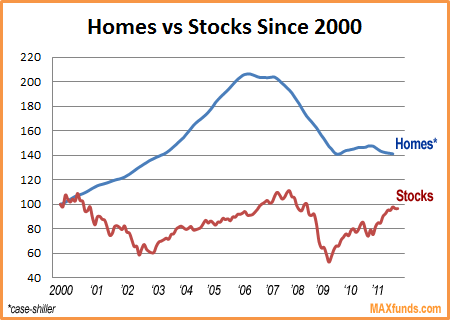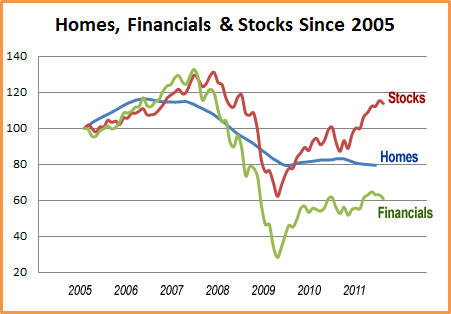Another Real Estate-Led Downturn?
The market’s recent weakness is causing a lot of anxiety. Since the last S&P 500 peak on April 29th, the actual decline has been a relatively mild 7.2% (as of June 15th). Yet the consistency of the slide is generating a lot of "worst decline since X" and "market down six weeks in a row" stories, stories that make investors nervous. Now we’re seeing people pull money from stock mutual funds a few months after big inflows.
As usual, reasons abound for the slide. The government is embroiled in a dramatic debt ceiling fight. The economy is showing signs of a slowdown. Commodity prices, notably oil, have taken off, and could either hamper growth or spark inflation. China and other hot emerging markets are having price problems, and could take steps that ultimately hurt our economy. A well-known economic researcher/doomsayer that predicted the financial crisis (and probably ten other disasters that never materialized) recently forecast a "perfect storm" brewing for the global economy.
Our default reason for this latest market move is simple: the market usually does the opposite of what fund investors want it to do. Fund investors put just under $20 billion into stock funds in January. Both domestic and foreign funds experienced big inflows. According to the ICI, this was the biggest inflow into stock mutual funds since February 2007, just a few short months before a huge slide started. February was a pretty big inflow month as well, the biggest in well over a year. So during this long rebound in stocks that started in March 2009, investors pulled money out of stock funds, until this year. It's no wonder stocks started to slide in April…investor confidence just came back.
Of course, this market decline could simply be a coincidence, a "reversion to the mean", which is a fancy way of saying if the market goes up 6% in a year and 20% for a few years in a row, it’s due for a few bad years. Stocks have moved up quickly in anticipation of a rebounding economy that now doesn’t seem to be rebounding very bountifully – although corporate profits are doing swell. Economic reality is dampening investor optimism in stock prices.
Generally, when a market goes up quickly, it's more prone to larger drops. Most real crashes happen following big, fast runs up, like in 1929 and 1987. Longer bear markets can happen after long runs up (2000, 1965). The most recent major crash didn't occur after a particularly long or fast run up, yet we saw the S&P 500 slide more than 50% from the top in 2007 to the bottom in 2009.

The last major slide in stocks followed a slide already underway in everyone’s favorite asset class: real estate. The troubling parallel right now is declining home prices, which turned south again late last summer.
Home prices went straight up during the whole 2000-2005 period for stocks, an era that saw investors start to give up on stock investing, particularly in U.S. stocks, as the equity-bummer decade wore on.
This divergence began to turn in April 2006, when home prices peaked nationally, according to the S&P Case-Shiller Index. Stocks didn’t hit their highs until September 2007. The global economy and stock market had become so mired in financing and real estate that it simply couldn’t handle a significant (or even a mild) downturn in real estate prices.
Yet new home prices went up for years without stocks going up, so why do we need home prices to go up now in order for stocks to rise? There's generally not much of a long-term correlation, largely because home prices are a fairly crummy asset class that simply keeps pace with inflation. In fact, right now, home prices in places like Miami are at the same level they were in the 1980s (adjusting for inflation.) Stocks are tied more to economic growth, and over time, (last decade aside), stocks usually beat inflation.
We're still treading on the thin ice that is asset-backed leverage. Banks (and the government) are sitting on trillions of home loans that will begin deteriorating again if the recent home price slide intensifies. People will feel poorer, so they'll save more and spend less.
On a national level, we now have less equity (under 40%) in our homes than any time since World War II. That figure was more than 60% in the bubble years, although some of the decline could be explained by the requirement of less money down to buy. Homeownership figures are back down to 1998 levels.
 We don’t need another real estate bubble to save the economy or raise stock prices, but we do need real estate prices to at least not go down much.
We don’t need another real estate bubble to save the economy or raise stock prices, but we do need real estate prices to at least not go down much.
Financial stocks began sliding a few months before the stock market headed down in 2007. Financial stocks like those in the Financial Select Sector SPDR (XLF) ETF peaked in mid-February of this year, more than two months before the slide in the S&P 500. And actual home prices? They rebounded slightly starting in mid-2009 (largely on multiple government support and incentives,) but that low energy rebound (unlike stocks, which are way up from early 2009) fizzled in the middle of 2010, and now we’re headed back down again.
Homes, then banks, then stocks. It’s a pattern no one wants to see repeated again.
One pattern that won’t repeat itself is the government response to the financial crisis. There won’t be a TARP 2.0, the bank loan program that saved most of Wall Street from extinction. Even though this program was largely a (mild) success for taxpayers (and could have been a bigger win if the government had taken bigger stakes for the bailout…) and a major success for financial services industrial complex, there's about as much political support for such a program today as a presidential run by Rep. Anthony Weiner.
We plan to use this slide to increase some stock fund allocations in our Powerfund Portfolios, especially since fund investors began exiting stock funds at a fast clip in early June. We'll also keep an eye on home prices for signs of further deterioration.
NEVER MISS A TRADE! SIGN UP FOR THE POWERFUND PORTFOLIOS FREE EMAIL ALERTS!
